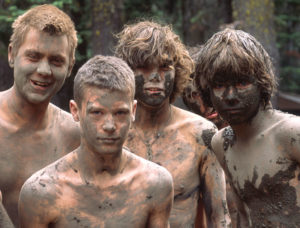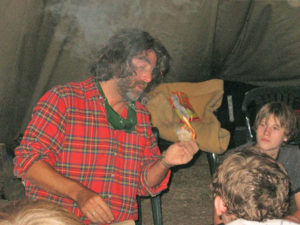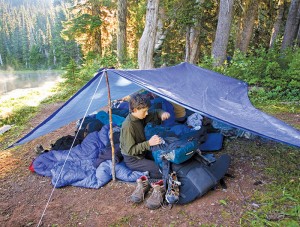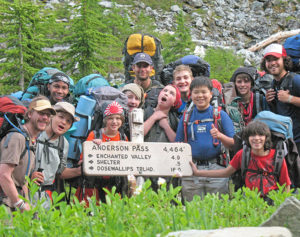By Kristen Stroud. Published in Northstate Parent Magazine, June 2010 issue.
Download original article (PDF)
 In his book “Why Gender Matters,” Dr. Leonard Sax describes the life-changing journey of a fourteen-year old American boy named Jeffrey. Concerned by his growing discontent, apathy and loss of interest in school, friendships, and sports, Jeffrey’s parents arranged for him to spend the summer assisting a professional hunting guide in Zimbabwe, Africa.
In his book “Why Gender Matters,” Dr. Leonard Sax describes the life-changing journey of a fourteen-year old American boy named Jeffrey. Concerned by his growing discontent, apathy and loss of interest in school, friendships, and sports, Jeffrey’s parents arranged for him to spend the summer assisting a professional hunting guide in Zimbabwe, Africa.
With rapt attention for the tasks required, Jeffrey could easily sit still awaiting prey in the African bush without his customary medication for attention deficit disorder and depression. Befriended by local Indabelli tribesman, Jeffrey learned to throw a javelin. When the time came to use it, the boy hit his mark, surprising everyone but himself. His success at hunting and the acknowledgement he received validated Jeffrey, reviving his spirit and bringing him back to life. Although Jeffrey still needed medication back home, according to Dr. Sax, “His whole attitude changed and his depression lifted. He no longer saw himself as a failure.”
 How, in this day and age, can parents, teachers, and communities sustain boys’ interests and capabilities, challenge them in ways that matter most to them, and allow for their valuable contributions? Dr. Sax’s book, Boys Adrift, explores five factors that he believes keep boys from thriving and reaching their fullest potential, including video and virtual gaming, the cultural devaluation of masculinity, unsuccessful teaching methods, over-used prescription drugs, and synthetic endocrine disruptors.
How, in this day and age, can parents, teachers, and communities sustain boys’ interests and capabilities, challenge them in ways that matter most to them, and allow for their valuable contributions? Dr. Sax’s book, Boys Adrift, explores five factors that he believes keep boys from thriving and reaching their fullest potential, including video and virtual gaming, the cultural devaluation of masculinity, unsuccessful teaching methods, over-used prescription drugs, and synthetic endocrine disruptors.
As any middle school teacher can testify, boys in puberty undergo a massive transformation – in their bodies, their relationships, and their identity. In addition to the obvious physical changes taking place, recent research pinpoints teens’ impaired ability in the areas of judgment and risk assessment to the incomplete development of the prefrontal cortex region of their brains. During normal masculine growth, parental relationships also inevitably evolve, particularly with the boys’ mothers.
Mark Telles, superintendent and principal of Castle Rock Elementary School, who has worked with boys and young men for over twenty years, warns, “If we don’t provide something for them, young men will refer to their peers, the media, and cyberspace to validate their beliefs without any guidance or feedback from older mentors or caring men in their community.”
 At this time in their lives more than ever, boys need their proverbial village to step up and show them what is right and good in themselves and their world. The well-used phrase, “It takes a village to raise a child,” only works when considerate and attentive men consistently make time for the boys in their lives. Cultural anthropologist Angeles Arrien quotes a Basque elder to describe the vital role mentors play, “They show up, pay attention, speak the truth, and are not attached to the outcome.”
At this time in their lives more than ever, boys need their proverbial village to step up and show them what is right and good in themselves and their world. The well-used phrase, “It takes a village to raise a child,” only works when considerate and attentive men consistently make time for the boys in their lives. Cultural anthropologist Angeles Arrien quotes a Basque elder to describe the vital role mentors play, “They show up, pay attention, speak the truth, and are not attached to the outcome.”
As though releasing an arrow from a bow, boys emerging into adulthood need an image of the target they are aiming for. Fathers, teachers, coaches, clergy, uncles, and grandfathers provide this instructive guidance. Yet a distinct event: a metaphorical break from their mother and boyhood, can launch boys into adulthood with clarity, confidence, and the conviction to live a life of integrity.
 Jeffrey’s journey to Zimbabwe typifies three crucial elements of a traditional coming of age rite of passage staged by various cultures around the world. After separation from his family and his familiar boyhood surroundings (some African tribes dramatize this part of the ritual by having the men “steal” the boy while the mother protests emphatically) Jeffrey was initiated into the world of men by tribal “uncles.” He earned his new identity after achieving a difficult personal challenge. Reunification with family acknowledged Jeffrey and his accomplishment. Naturally, parents may grieve the loss of the boy while celebrating the budding young man.
Jeffrey’s journey to Zimbabwe typifies three crucial elements of a traditional coming of age rite of passage staged by various cultures around the world. After separation from his family and his familiar boyhood surroundings (some African tribes dramatize this part of the ritual by having the men “steal” the boy while the mother protests emphatically) Jeffrey was initiated into the world of men by tribal “uncles.” He earned his new identity after achieving a difficult personal challenge. Reunification with family acknowledged Jeffrey and his accomplishment. Naturally, parents may grieve the loss of the boy while celebrating the budding young man.
Not to say that every boy needs to make a trip to Africa in order to find himself. Many boys participate in ceremonies marking their transition to adulthood through their church, mosque, temple, synagogue, family or cultural tradition. Nature-based camps also provide rites of passage for boys, including outdoor survival skills, group challenges and discussions, a solo initiation, and a welcoming of the young men back into family and community.
In many traditions, boys underwent an initiation or ordeal to prepare them for the demands of protecting, leading, and providing for their people. While searching for their identity and sense of place in the world some young men created a code of honor to navigate the world responsibly. Tim Corcoran, founder and director of Headwaters Outdoor School, created his own code of honor as a young man, and has been offering boys’ rites of passage for many years. “Boys today have lost the camaraderie men gained from gathering together to hunt and make tools in traditional cultures. Many boys have no exposure to nature. They live in an artificial world. We get them out and working together, challenging them and sending them out on their own to figure out who they are and who they choose to be as men.”
Boys to Men in Southern OregonHeadwaters Outdoor School;
(831) 423-3830.Rite of Passage Journeys;
(425) 485-7396.Books by Leonard Sax, M.D., P.h.D.:
- Why Gender Matters: What Parents and Teachers Need To Know About the Emerging Science of Sex Differences
- Boys Adrift: The Five Factors Driving the Growing Epidemic of Unmotivated Boys and Underachieving Young Men
- Girls on the Edge: The Four Factors Driving the New Crisis for Girls
According to author Robert Bly, modern life tends to confine the innate wild side of boys and men. Spirited challenges in natural surroundings reconnect boys with their native intelligence, stretching their competencies. “Many boys who come to us do not know how to work or be of service,” Tim Corcoran says. “We get them to go beyond the quitting point to see that they can do so much more than they realize.” Gnawing on real issues together, the boys discover that their peers share many of the same fears and insecurities. “Some of them realize, for the first time, that they are not alone,” Corcoran adds.
Many years ago, Marriage and Family Therapist John Cunningham created a rite of passage for his son, Isaac, with trusted men friends in his community. “Boys want to be seen. When they are surrounded by caring, thoughtful role models in their community, they know someone is watching whatever they do.” Traditionally, other men in the community, besides the boys’ fathers, offered honest and unbiased feedback. “Boys can take risks within the container created by men who know and care about them. Boys need to push against something,” advises Cunningham, “why not have it be against people you choose because of their values, insight and integrity?”
 Skylar Loughlin, a freshman at Mt. Shasta High School, attended a rite of passage program last summer. “It was really hard, but I loved it. I felt like my Dad saw me differently after I got kudos from the group for my hard work. I found out that I like to be around other guys who want to work hard and put all their effort into something like I did,” he says. When John and Susan Brennan’s thirteen-year old grandson attended a boys’ rite of passage, Susan recalls, “We were amazed. All of the negative attention he received at school turned to positive when he was able to apply his energy and creativity to something engaging and productive. He was a different kid after that experience. He even stood taller and straighter.”
Skylar Loughlin, a freshman at Mt. Shasta High School, attended a rite of passage program last summer. “It was really hard, but I loved it. I felt like my Dad saw me differently after I got kudos from the group for my hard work. I found out that I like to be around other guys who want to work hard and put all their effort into something like I did,” he says. When John and Susan Brennan’s thirteen-year old grandson attended a boys’ rite of passage, Susan recalls, “We were amazed. All of the negative attention he received at school turned to positive when he was able to apply his energy and creativity to something engaging and productive. He was a different kid after that experience. He even stood taller and straighter.”
Knowing that boys will continue to test and challenge themselves and each other and that not all boys will get the mentoring they need, or be ready to live honorably, Mark Telles alerts them to an internal compass that can point them toward healthy choices throughout their lives. By orienting boys to introspection, Mark reveals how insight about their thoughts, feelings, motivations, urges, desires, and the consequences of their actions, gives young men a better chance of keeping and using their power wisely.
 Not meant to be a quick fix or a one shot deal, ideally a rite of passage stands out as a peak experience for boys who have long-benefited from the loving attention of at least one honest, trustworthy, caring adult. Rites of passage immerse boys in the realness of what it means to be a man in the conscientious presence of mentors. Discovering and declaring principles to live by launches young men into a promising future filled with possibility.
Not meant to be a quick fix or a one shot deal, ideally a rite of passage stands out as a peak experience for boys who have long-benefited from the loving attention of at least one honest, trustworthy, caring adult. Rites of passage immerse boys in the realness of what it means to be a man in the conscientious presence of mentors. Discovering and declaring principles to live by launches young men into a promising future filled with possibility.
Despite growing up with the close friendship and tutelage of an older brother and the joy-filled adventure of raising two full-blooded boys, writer Kristen Meyer Stroud claims no authority to speak on the affairs of boys and men.

Thanks for this informative article, Kristen. Rites of Passage for boys is one of the best things we can offer our society as a whole. The men need to want to do it, of course, since we women can’t! I’m grateful for the men who are on the leading edge of this work. Rites of passage for girls, anyone??